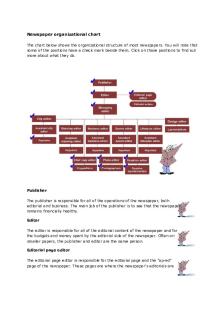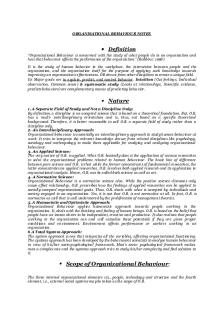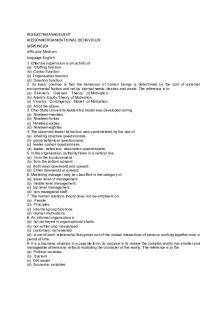Organisational Rights PDF

| Title | Organisational Rights |
|---|---|
| Author | Gudani Rams |
| Course | Labour Law 3 |
| Institution | Vaal University of Technology |
| Pages | 4 |
| File Size | 100.7 KB |
| File Type | |
| Total Downloads | 36 |
| Total Views | 153 |
Summary
Organisational rights are of paramount in the field of work. they allow employees to counterbalance thier powers with employers through trade unions representation of their interests, thus avoiding exploitation and abuse of power by employers to employees....
Description
INTRODUCTION Employees have matters of interests they would like to raise or see being developed in the workplace, thus they require registered trade unions to represent their interests with the employer through collective bargaining. When interests of employees are met in the workplace by the employer service delivery of employees becomes effective. When the LRA of 1995 was enacted, a clear delineation was made between majority unions and sufficiently representative unions. A registered majority union was accorded all six of the organizational rights, while a sufficiently representative registered union enjoyed three of the rights. These rights accorded to registered trade unions provide protection and representativeness of employees not to be exploited by their employers without any defense or benefits in the workplace The 2014 amendments to the LRA obscured this clear distinction somewhat by allowing a sufficiently representative union to obtain the rights previously accorded to majority unions only if that union is the most representative union in the workplace. An employer and a registered majority union or parties to a bargaining council can conclude a collective agreement in order to establish the threshold of representativeness required to obtain the rights of access, deductions and leave for office bearers. WHAT ARE ORGANISATIONAL RIGHTS They are union rights, not employee rights and are bestowed on registered trade unions only. Organizational rights are set out in part A of chapter 3 of the LRA. The six organizational rights are found in section 12 to 16 of the Act and are the right to: o Access of the workplace o The deductions of union subscriptions from employees o Elect union representatives in the workplace o Paid leave for office bearers o Paid time off for union representatives o Disclosure of information
1
Majority representative unions are awarded all six of the rights, while sufficiently representative registered trade unions are only provided with the right to Access of the workplace, deductions of union subscriptions and paid leave for office bearers. In terms of the LRAA of 2014 it is possible for a union that does not meet the threshold to be granted these rights. In arbitration the CCMA can grant these rights to the union that does not meet the threshold if the union represents a significant interest or has a substantial number of members in the workplace and if all the parties to the collective agreement participated in the arbitration proceedings. REGISTRATIONS OF UNIONS The LRA does not place obligations to trade unions to be registered, but offers benefits to those who are recognized in terms of the law. Few limitations on the right to register have been retained due to the commitment of the LRA to freedom of association. In this way, it has led to the previous requirements that a union or employers organization to be sufficiently representative no longer applies. The aim of registration is to promote the observance of democratic principles in the internal operation, governance of unions and to ensure proper financial control of funds in line with public policy. The formal requirements of the LRA are designed to give effect to this purpose. Trade unions may apply for registration provided that they meet the following requirements: o It has adopted a name or abbreviation which is not close to that of another organization to avoid confusion. o It has adopted a constitution that complies with section 95 (5) and (6) o It is a genuine trade union o It has an address in the Republic South Africa o It is independent, free from any direct or indirect control, interference, or influence by the employer.
2
If a trade union meets these requirements, the registrar has no discretion but to register the trade union. CASE LAW In the case of POPCRU v Ledwaba No & others, POPCRU was the majority union representing the employees of the department of correctional services (DCS). POPCRU had concluded a threshold agreement with the DCS where in it agreed to the minimum representivity required for obtaining organizational rights. POPCRU was also a member of the safety and security sectoral bargaining council (SSSBC). SACOSWU, a minority trade union approached the DSC seeking basic organizational rights, as SACOSWU had insufficient membership it wished to accrue such rights by means of collective agreement. Remarkably the DSC entered into a collective agreement with SACOSWU. POPCRU in turn challenged the legitimacy of the DSC decision alleging that in doing so the DSC undermined its collective agreement with POPCRU. The arbitrator before the general public service sectoral bargaining council found in favour of SACOSWU. POPCRU elected to review the decision before the labour court in upholding POPCRU’s concerns the court made. The constitutional court found that POPCRU interpretation of section 18 was incorrect as it would effectively deny minority unions the right to engage in collective bargaining. The constitutional court reasoned that this right is conferred on every trade union by the constitution, irrespective of whether the union is a minority union. The constitutional court stated that section18 does not prohibit collective bargaining between an employer and a minority union where there is a collective agreement between that employer and the majority trade union. It held that such prohibition would be inconsistent with the constitution and international law. Therefore, in this instance, yes a minority union can be entitled to acquire organizational rights even though they do not meet the threshold prescribed in the collective agreement, provided that the employer collectively bargained with a trade union to discuss and reach consensus about a minority union acquiring certain organizational
3
rights. The LRA favours a majoritarian approach to collective bargaining within the workplace, to that extent majority union and employers can legitimately curtail and regulate the rights of minority unions to be granted organizational rights within the workplace. CONCLUSION In closing, it is clear that in terms of the LRAA of 2014 that the threshold which is prescribed in terms of a collective agreement does not always prevail on deciding whether minority registered trade unions should or shouldn’t obtain some organizational rights, but a legitimate agreement between an employer with a trade union can curtail and regulate organizational rights. Therefore employers should Endeavour to obtain legal advice before considering concluding an agreement with a minority union, especially where another agreement on the same or similar rights is in place with a majority trade union in the workplace.
4...
Similar Free PDFs

Organisational Rights
- 4 Pages

Organisational structure
- 3 Pages

Organisational Communication
- 3 Pages

Organisational feasibility
- 2 Pages

Organisational Behaviour
- 26 Pages

Organisational behaviour
- 1 Pages

Real Rights v Personal Rights
- 11 Pages

Lec+2-+Organisational+Behaviour
- 22 Pages

Organisational Behaviour Notes
- 9 Pages

Organisational Behaviour MCQ
- 121 Pages

Assignment 3 Organisational Analysis
- 10 Pages
Popular Institutions
- Tinajero National High School - Annex
- Politeknik Caltex Riau
- Yokohama City University
- SGT University
- University of Al-Qadisiyah
- Divine Word College of Vigan
- Techniek College Rotterdam
- Universidade de Santiago
- Universiti Teknologi MARA Cawangan Johor Kampus Pasir Gudang
- Poltekkes Kemenkes Yogyakarta
- Baguio City National High School
- Colegio san marcos
- preparatoria uno
- Centro de Bachillerato Tecnológico Industrial y de Servicios No. 107
- Dalian Maritime University
- Quang Trung Secondary School
- Colegio Tecnológico en Informática
- Corporación Regional de Educación Superior
- Grupo CEDVA
- Dar Al Uloom University
- Centro de Estudios Preuniversitarios de la Universidad Nacional de Ingeniería
- 上智大学
- Aakash International School, Nuna Majara
- San Felipe Neri Catholic School
- Kang Chiao International School - New Taipei City
- Misamis Occidental National High School
- Institución Educativa Escuela Normal Juan Ladrilleros
- Kolehiyo ng Pantukan
- Batanes State College
- Instituto Continental
- Sekolah Menengah Kejuruan Kesehatan Kaltara (Tarakan)
- Colegio de La Inmaculada Concepcion - Cebu




